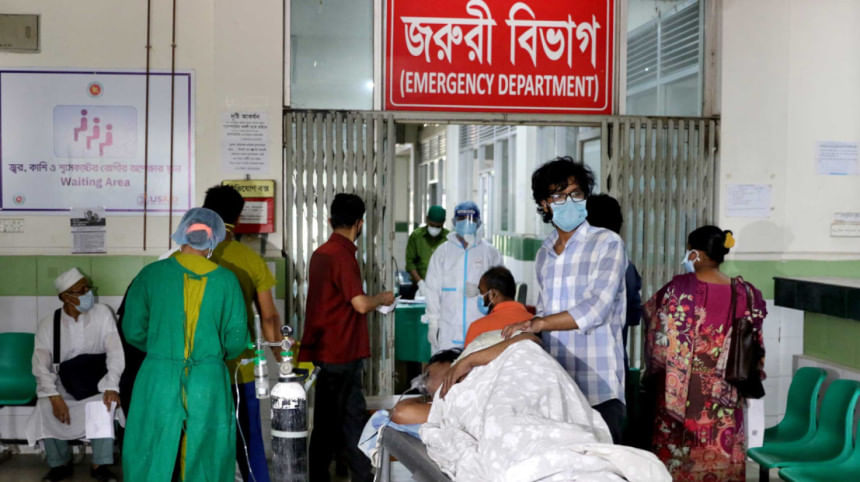Ambulance syndicates are holding patients hostage

Syndicates are nothing new in Bangladesh. But can their unbearable excessiveness drive a family towards a cruel and tragic fate?Recently, our country witnessed one such brutal incident.
This time, the victim was a newborn, who had just arrived in this world, carrying a wave of joy for the family and promise of a future. But that journey was cut short by the ambulance syndicate of Shariatpur. A baby was born in a local clinic with severe breathing complications. The family was advised to rush the child to Dhaka, and in desperation, they hired an ambulance.
Not long into the journey, their ambulance was intercepted by a member of Shariatpur's ambulance syndicate. Despite desperate arguments and pleas, the ambulance was not released for a while. And in that cruel delay, the newborn, who had barely set foot on earth, was sacrificed at the altar of a syndicate's greed.
Ambulances of this syndicate routinely charge far more than the standard fare for trips such as Shariatpur to Dhaka. But does money carry more value than life? As citizens of this state, how devoid of conscience have we become to let a newborn's life be lost due to abuse of power? Whose responsibility is that?
The father who lost his child has worked for 18 years repairing electric lines in Dhaka's Mirpur. He refused to file a case, knowing he neither had the financial ability nor the willpower left to endure a legal battle. Perhaps the shock was too unbearable for him. The neatly folded baby clothes, prepared with care and hope, will now never be worn. The Rapid Action Battalion arrested one man named Sabuj Dewan in this connection.
In hindsight, there might be nothing wrong with forming an association to protect one's interests. But when such organisations or unions are turned into tools of extortion, pressuring ordinary people in their moments of helplessness, they must be dismantled without delay. Across Dhaka, Chattogram, and the district towns, hospital-centred ambulance syndicates are active. These groups bar patients from boarding any ambulance other than their cartel's, forcing families to pay extortionate fares in moments of dire emergency. Can there be anything more inhumane?
Earlier this year, a close relative of mine underwent surgery at the National Institute of Neurosciences Hospital in Dhaka. For the procedure, I bought some items from one store and then went to another pharmacy to buy the remaining items. However, the shopkeeper of the latter shop refused to sell products to me simply because I had not purchased all the listed items from his store. Given the urgent need of the medical supplies and their limited availability, the shopkeeper deliberately withheld from selling them. This is the reality of the syndicates that exist in our healthcare system: profits first, lives come second.
The health sector in Bangladesh is already sinking into a darkness of corruption and mismanagement. On top of that, when emergency services like ambulances are turned into rackets of extortion, it is like the final nail on the coffin. Ordinary people have been the victims of this ruthless business for years. The commissions from this exploitation reach everyone—from hospital staff to ward boys. There is no standardised ambulance fare, nor any regulatory policy. Owners and drivers collude to extort helpless patients as they please.
And whenever reforms are attempted, the predictable response is road blockades or strikes—pressuring the government into submission. And once again, it is ordinary people who pay the ultimate price.
If we truly care about life and dignity, the syndicates entrenched around ambulances, hospitals, clinics, and even hospital beds must be uprooted. Because this is not just about services, this is about our very survival. Reform begins with the government fixing clear, transparent ambulance fares based on distance, and enforcing them with zero tolerance. Anyone who violates the rule should lose their licence for life, and owners who exploit patients should be permanently barred from running transport businesses.
Additionally, a 24/7 national hotline must be introduced so families can report such abuse in real time. The state itself must expand affordable ambulance services by buying more vehicles, ensuring coverage across all areas and at all hours. Finally, hospitals must come under independent monitoring so that no syndicate can hold lives hostage again. Because unless these steps are taken now, another family will bury their child, another newborn will be denied the right to live, and another life will be stolen by greed.
This is about survival, not convenience. Every delay, every inflated fare, every denial of service is a question of life and death. And until these syndicates are crushed, ordinary people will continue to be held hostage in their most vulnerable moments.
Nafew Sajed Joy has a masters degree in social sciences from University of Dhaka. He can be reached at [email protected].
Views expressed in this article are the author's own.
Follow The Daily Star Opinion on Facebook for the latest opinions, commentaries and analyses by experts and professionals. To contribute your article or letter to The Daily Star Opinion, see our guidelines for submission.

 For all latest news, follow The Daily Star's Google News channel.
For all latest news, follow The Daily Star's Google News channel. 










Comments